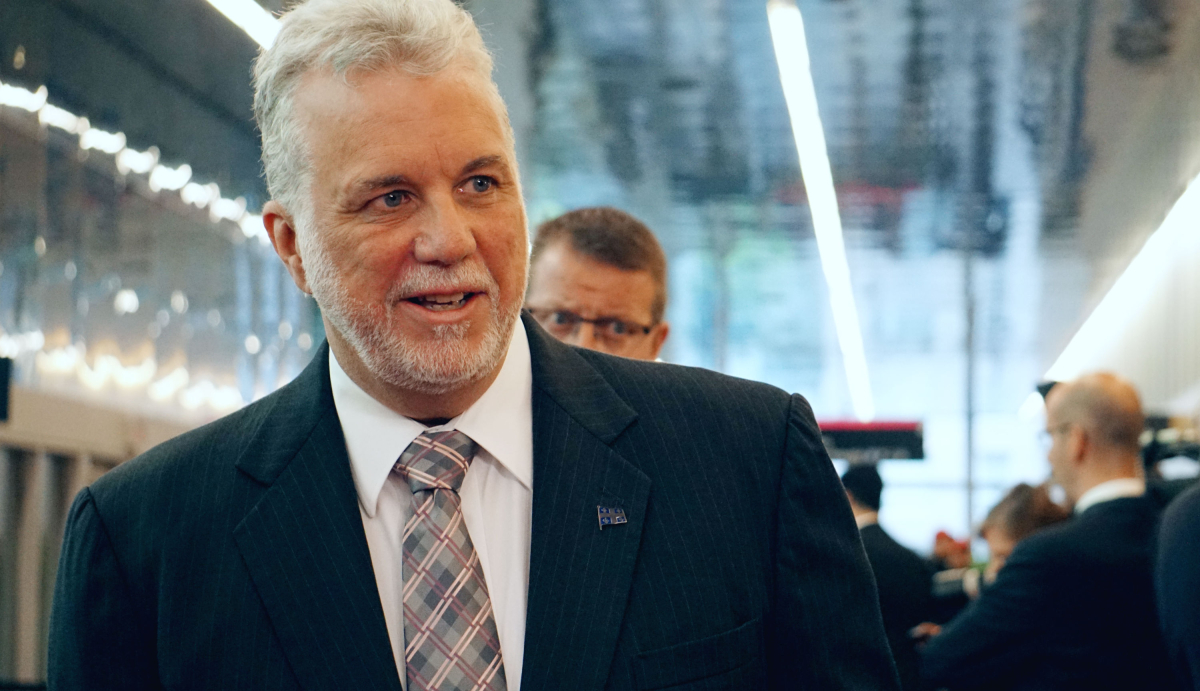Prime Minister Justin Trudeau’s government is sidestepping an appeal from Canada’s two largest provinces to halt the work of Canada’s National Energy Board (NEB) — a federal regulator that even the government says needs an overhaul to rebuild public trust.
Ottawa proposed on Thursday to reform the Calgary-based NEB in response to criticism, including from federal Liberals when they were in opposition, that it had lost the confidence of Canadians.
"Our government is modernizing and rebuilding trust in Canada’s lifecycle energy regulator so that safe and credible projects can proceed," the government said in a discussion paper containing a framework for new legislation this fall to amend four major Canadian energy and environmental laws.
But moments after making that proposal public, a government spokeswoman delivered a different message about the NEB.
“We do continue to have confidence in the NEB and the role it plays to support critical decisions on key projects during the review period, based on the interim principles announced in January 2016,” a Natural Resources Canada spokeswoman said in an email to National Observer. "The government of Canada will continue its efforts to restore public trust in our regulatory processes and environmental assessments, because without the trust of Canadians no pipeline project will move forward."
Ontario and Quebec urge Jim Carr to stop Energy East review
The department was responding to questions about a new letter sent by energy ministers from the Ontario and Quebec governments in June that urged the Trudeau government to postpone a review of Energy East, a 4,500-kilometre crude oil pipeline linking Alberta to New Brunswick, until it completes reforms to the NEB and Canada's environmental laws.
The letter to federal Natural Resources Minister Jim Carr, from Quebec Energy and Natural Resources Minister Pierre Arcand and his Ontario counterpart, Glenn Thibeault, was sent in response to an independent federal panel's report on the modernization of the NEB released in May. The provincial ministers questioned whether the existing NEB was able to carry out its mandate.
“Quebec and Ontario recommend that an important outcome of NEB Modernization be a framework for the NEB to review major energy projects that is predictable and increases public confidence,” wrote Minister Arcand and Thibeault in the letter obtained by National Observer.

They also expressed hope that “the process to modernize the NEB and any new rules that are announced by the federal government provide predictable treatment for major energy projects currently under NEB review."
The Trudeau government has said that it introduced interim principles to improve the review process for major industrial projects while it pursues efforts to improve Canada's environmental laws. But it has been criticized by scientists, municipal leaders and Indigenous leaders for approving projects without completing efforts to amend existing legislation.
The Quebec Energy and Natural Resources department confirmed Minister Arcand hopes Ottawa will wait until the end of the modernization process before starting the review of the Energy East pipeline even if it will delay the the project.
“We think the process should be completely credible and stabilize the way reviews are done before starting discussions (on the Energy East project),” further added Quebec Premier Philippe Couillard to the press on Wednesday according to QMI.

Panel found 'serious concerns' that NEB was 'captured' by industry
The proposed Energy East pipeline would carry up to 1.1 million barrels a day of crude oil and cross both Ontario and Quebec, going under major waterways such as the St. Lawrence and Ottawa rivers. It is being proposed by Calgary-based TransCanada Corp., a multinational energy company that is also proposing to build the Keystone XL pipeline, which would link Alberta's oil producers to refineries and shipping ports on the Gulf coast of Texas.
Oil and gas industry proponents and large Canadian banks backing the project argue that it's the key to jobs and growth in Canada's slumping oil industry. Opponents have argued that the project was risky and would lead to spills, while pushing Canada's international climate goals out of reach.
The Quebec government is already conducting a separate review of the Energy East pipeline.
The Couillard government and Ontario Premier Kathleen Wynne's government also asked Carr, in their letter, for "recognition and respect for provincial/territorial jurisdiction on energy matters."
"The purpose of the letter was to demonstrate our provinces' ongoing commitment to collaboration and co-operation in the modernization of the National Energy Board, and to share our joint input into some areas that merit further discussion," said Thibeault's spokesman Colin Nekolaichuk in an email to National Observer.
"In 2015, our government approved a number of principles which continue to guide Ontario’s position on the Energy East pipeline, including protection of the environment, consultation with Indigenous communities, development of world-class safety standards, and established economic benefits for our province. Our government will continue to be vocal in our advocacy of Ontario interests in the NEB process."
Revelations by National Observer that high-ranking members of the regulator had privately met with former Quebec premier Jean Charest, who was working for TransCanada at that time, shook the public trust and raised concern about whether the Board was biased. The revelations caused the shutdown of the hearings and the recusals of all of the high-ranking federal officials involved in the meeting, including NEB chief executive and chairman Peter Watson.
In January, the NEB decided to restart the process of evaluation for the Energy East pipeline.
A few months later, in May, a panel of experts appointed by the Trudeau government recommended dismantling the NEB to establish a “modern Canadian Energy Transmission Commission” that would “radically increase the scale and scope of its stakeholder engagement to build trust and driver better outcomes for all Canadians.” The panel said this was in response to the “crisis of confidence” it had observed following public consultations across the country.
“We heard that Canadians have serious concerns that the NEB has been ‘captured’ by the oil and gas industry, with many Board members who come from the industry that the NEB regulates, and who — at the very least appear to — have an innate bias toward that industry,” noted the panel in its final report.
In recent months, environmental groups such as Environmental Defence, Équiterre and Greenpeace Canada, have also asked for the evaluation of the Energy East Project to stop until the regulator has been modernized.
Asked how it squares the panel's findings and its own commitment to modernize the embattled NEB with its statement to National Observer that it has "confidence in the NEB and the role it plays to support critical decisions," Natural Resources Canada pointed once again to the interim measures it implemented to improve public trust in the regulator.
"The Government of Canada understands the crucial role the NEB plays and will continue to rely on the NEB to support critical decisions to key projects while the NEB modernization review is underway," said a spokeswoman in an email. "We are focused on strengthening the organization so that it can better respond to future needs."

Peter Watson said the law was at the root of the NEB's challenges
Meantime, the regulator is continuing to consult Canadians on how they “should carry out the Energy East hearing” until July 15.
But chief executive Watson said on Wednesday has that Canadian law was dated and making it difficult for the regulator to do its job, according to The Canadian Press.
“Some of the things at the root of our challenges are embedded in our enabling legislation, so I actually think that whatever comes out of these reviews, it’s kind of time to refresh for the 21st century,” said NEB chairman Peter Watson.
The federal government's discussion paper, released on Thursday, indicated it planned to introduce major changes this fall to the Canadian Environmental Assessment Act, 2012, the Fisheries Act, the Navigation Protection Act and the National Energy Board Act to improve transparency, public participation and consultations with Indigenous people.
But the government says it still plans on allowing the review of the Energy East Project to proceed.
"In January 2017, the National Energy Board’s Energy East review panel determined that it will start a new review process. This review will take into consideration scientific knowledge, the views of Canadians and Indigenous knowledge," said Natural Resources Canada spokeswoman Jocelyn Argibay in an email to National Observer. "Once the National Energy Board determines the project application is complete it will issue a Hearing Order and determine the next steps for its review to begin."

Editor's Note: This story was updated at 3:55 p.m. E.T. on Fri. June 30, 2017 to include additional comments from Natural Resources Canada.







Comments
Encore, plus ça change.
Did this "different message" result from last months lobbying efforts by TransCanada, Suncor, Shell and Husky?
Looks that way:
From the registry, Russ Girling of T/C meets with Jim Carr, NRC, 2017/05/03
"Legislative Proposal, Bill or Resolution
To seek termination of a memorandum of understanding between the federal government and the Corporation, which will lead to the variation of Certificate of Public Convenience and Necessity No. GC-30. National Energy Board Act (R.S.C., 1985, c. N-7)
Policies or Program
Providing input to the National Energy Board at CEPA organized events, on pipeline-related matters including: project review timelines, role of regulators in pipeline safety and opportunities for industry-wide safety improvements.
To discuss and seek government support for a potential electricity generating project, including but not limited to location and scope of project.
To discuss and seek government support for planning, building and operating LNG pipelines in BC.
To discuss skills development requirements for energy infrastructure projects.
To discuss the status and implementation of the federal government's proposed greenhouse gas regulations.
To seek continued support and advocacy for the Keystone XL pipeline as we apply for permits and approvals from governments and public authorities in the USA.
To seek government support for energy infrastructure development, including pipelines, gas storage and energy.
To seek government support for the proposed Energy East project, including updates on project development and stakeholder consultation progress."
They harp on and on about "public confidence". Pity they don't seem so interested in "making good decisions". Would seem the idea is to keep doing whatever the fossil fuel lobbies want, but pull the wool over our eyes more effectively so we'll be "confident" in the results.